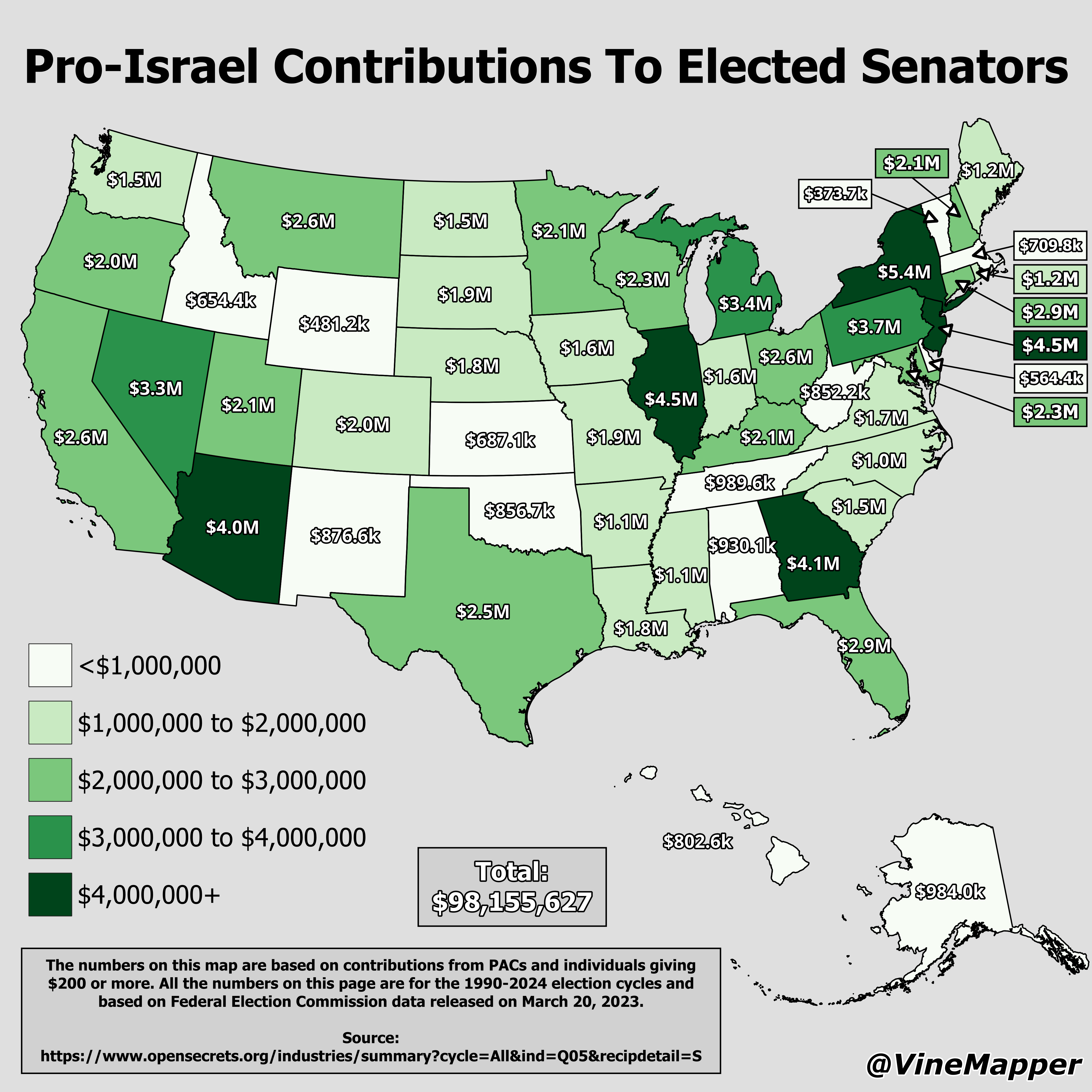Pro-Israel Contributions to Elected Senators Map


David Chen
Data Visualization Specialist
David Chen is an expert in transforming complex geographic datasets into compelling visual narratives. He combines his background in computer science ...
Geographic Analysis
What This Map Shows
This visualization provides a detailed overview of financial contributions made to elected U.S. senators by pro-Israel organizations and individuals. The map highlights the geographic distribution of these contributions across various states, illustrating both the magnitude of support and the political landscape surrounding U.S.-Israel relations. By examining this map, one can quickly identify which senators have received significant backing from pro-Israel interests, shedding light on the broader influence of these contributions on American foreign policy.
Deep Dive into Pro-Israel Contributions
Pro-Israel contributions to elected officials in the United States have become a significant factor in shaping the country's foreign policy in the Middle East. These contributions often come from a mix of political action committees (PACs), individual donations, and various advocacy groups that prioritize strong U.S.-Israel relations. The financial backing serves not only as a measure of support for individual senators but also reflects the strategic interests of the Jewish community and pro-Israel advocates in the U.S.
Interestingly, the contributions are not limited to a single political party; both Democrats and Republicans have received substantial donations from pro-Israel entities. This bipartisan support illustrates the widespread agreement on the importance of maintaining a strong alliance with Israel among many U.S. lawmakers. In fact, the American Israel Public Affairs Committee (AIPAC), one of the most influential pro-Israel lobbying groups, works actively to educate and advocate for policies that support Israel, often mobilizing contributions to sway political decisions.
Statistics show that the impact of these financial contributions can be significant. For instance, in the 2020 election cycle, pro-Israel groups contributed over $22 million to congressional candidates, with a notable percentage flowing to senators who have demonstrated consistent support for Israel in their voting records. This financial influence can help ensure that legislation favorable to Israel—such as military aid, trade agreements, and diplomatic initiatives—remains a priority in Congress.
Moreover, the strategic allocation of these contributions often focuses on key states with influential senators. For example, states with large Jewish populations, such as New York and California, tend to see higher levels of contributions. However, support is also observed in areas where political leaders may not traditionally align with pro-Israel positions, demonstrating the reach and adaptability of pro-Israel advocacy.
Regional Analysis
Examining the map reveals distinct patterns in pro-Israel contributions across the United States. For instance, New York, home to one of the largest Jewish populations in the country, consistently ranks among the top states for pro-Israel donations. Senators from New York often receive substantial backing from these groups, reinforcing the state's influence on U.S. foreign policy.
On the other hand, states like Texas and Florida also show significant contributions, albeit for different reasons. Texas has a large evangelical Christian population that strongly supports Israel, while Florida's contributions are influenced by its diverse demographic, including a sizable Jewish community. The geographical spread of contributions indicates that support for Israel transcends traditional political boundaries, allowing for a nuanced understanding of how these donations impact legislative priorities.
Interestingly, states with fewer Jewish constituents, like the Midwest and Southern states, still receive notable contributions. This can often be attributed to the strategic interests of pro-Israel organizations seeking to cultivate support among a broader political spectrum, emphasizing the importance of Israel to American national interests.
Significance and Impact
Understanding the patterns of pro-Israel contributions to elected senators is crucial, as it underscores the intersection of finance, politics, and foreign policy. The implications of these contributions extend beyond mere financial support; they play a vital role in shaping legislative agendas and diplomatic relations. For instance, when senators heavily funded by pro-Israel organizations advocate for increased military aid to Israel or oppose resolutions criticizing Israeli policies, it raises questions about the influence of money in politics and the extent to which foreign interests can shape domestic policy.
As we look to the future, it’s essential to consider how these contributions might evolve in response to changing political landscapes and public opinion. With increasing polarization in American politics, the dynamics surrounding pro-Israel contributions will likely shift, potentially affecting the level of bipartisan support that has historically characterized U.S.-Israel relations. Have you noticed how public sentiment around foreign aid and international alliances is changing? This will undoubtedly influence how future contributions are mobilized and which candidates receive support.
In conclusion, the map of pro-Israel contributions to elected senators is more than just a visual representation of financial support; it’s a reflection of the intricate relationship between domestic politics and international diplomacy. As these patterns continue to evolve, understanding their implications will be crucial for grasping the future of U.S.-Israel relations and the broader geopolitical landscape.
Visualization Details
- Published
- September 6, 2025
- Views
- 104
Comments
Loading comments...